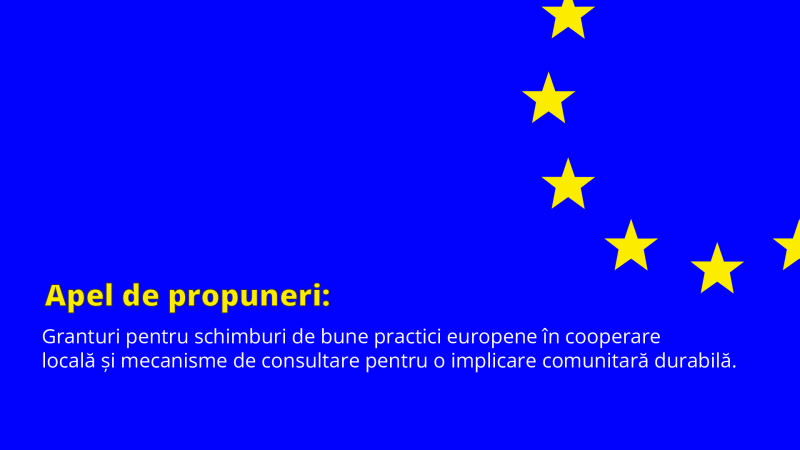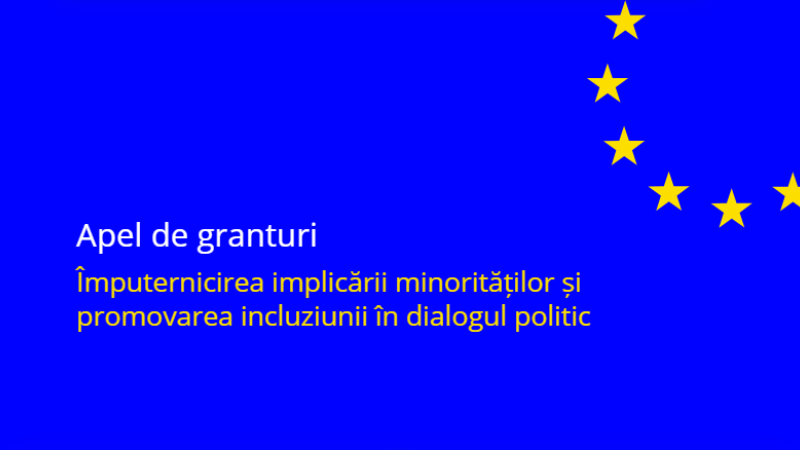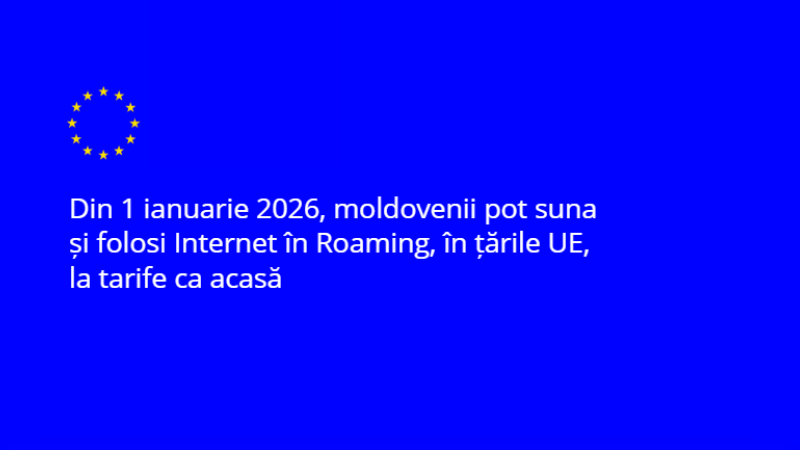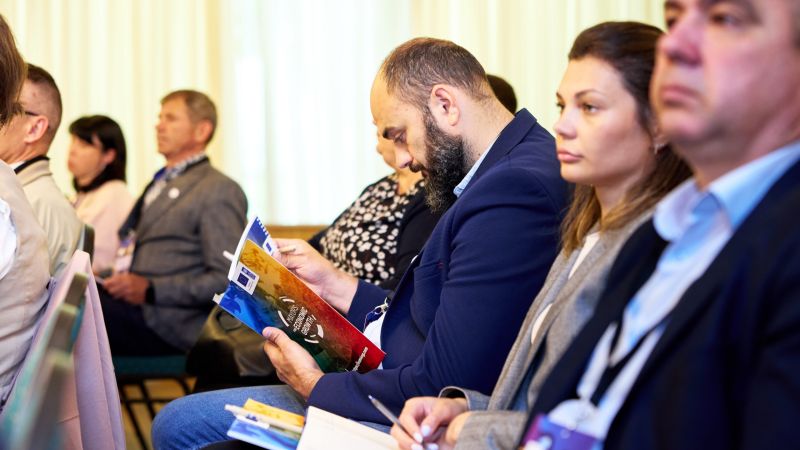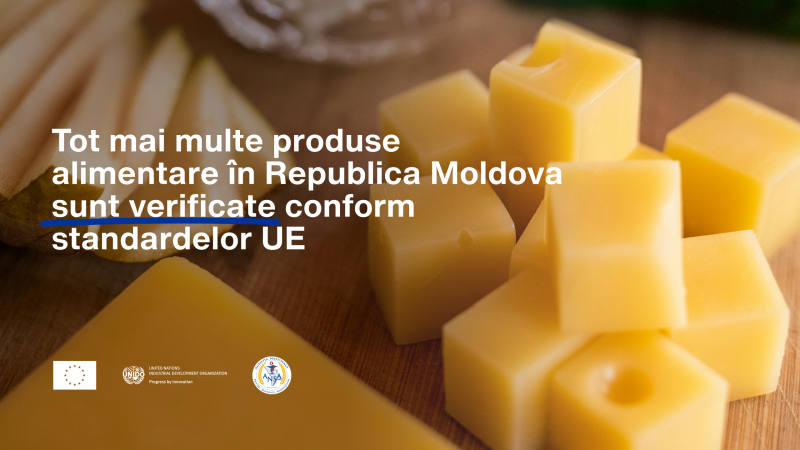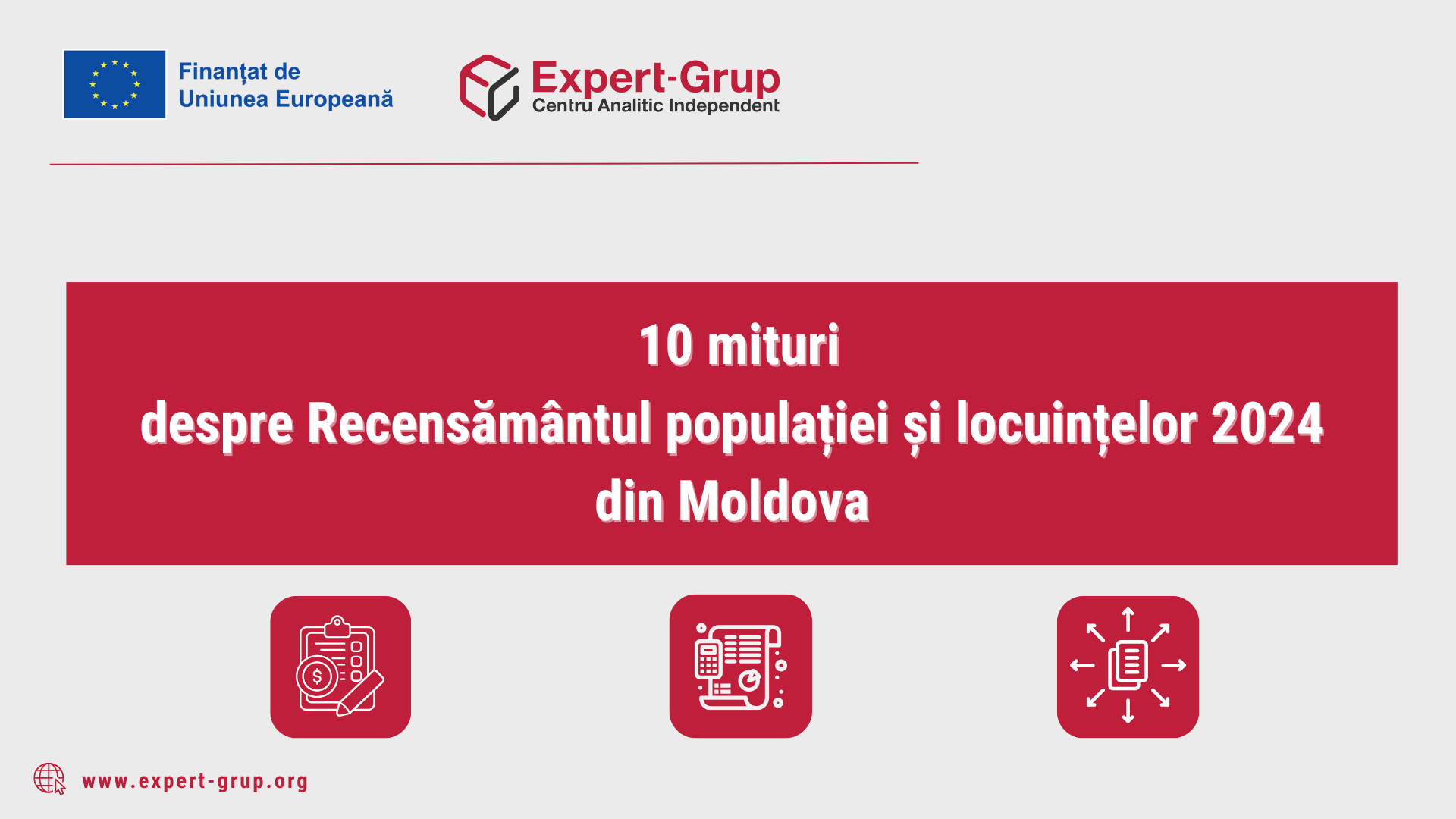
Zece mituri despre Recensământul populației și locuințelor 2024 din Moldova
În perioada 8 aprilie – 7 iulie 2024, în Republica Moldova se va desfășura Recensământul Populației și Locuințelor, în cadrul căruia vor fi colectate date despre numărul și caracteristicile demografice ale populației, precum și despre clădirile rezidențiale și condițiile de trai. Cu referire la recensământ, în presă și pe rețele de socializare, au început să apară diferite materiale cu interpretări eronate despre „scopurile adevărate” ale recensământului și datele ce vor fi colectate. Noi am adunat cele mai frecvente zvonuri despre recensământ și am verificat dacă ele sunt adevărate sau nu.
Mitul nr. 1. Informația despre clădiri și locuințe este colectată pentru ca Fiscul să poată colecta mai multe impozite pe imobile sau să-i identifice pe cei care stau la chirie fără contracte oficiale.
Fals. În cadrul recensământului NU vor fi colectate date despre valoarea casei sau apartamentului în care trăiești și nici nu vei fi întrebat(ă) dacă ai contract de chirie sau nu. Lista întrebărilor ce va fi dată în cadrul recensământului poate fi consultată pe site-ul web al Biroului Național de Statistică. Datele ce vor fi colectate despre clădiri se referă la materialele din care sunt construiți pereții și acoperișul, precum și anul construcției clădirii. Aceste date vor fi utilizate pentru elaborarea politicilor publice, de exemplu, pentru a determina ponderea caselor cu acoperișuri din foi de ardezie care conțin substanțe toxice pentru sănătate, precum și a celor vulnerabile la dezastre naturale. Datele colectate despre locuințe se referă la dotarea lor cu principalele comodități cum ar fi baie sau duș, veceu, încălzire, bucătărie etc., precum și suprafața locuinței. Astfel vom afla în ce condiții trăim și în ce domenii trebuie de luat măsuri pentru a îmbunătăți condițiile vieții.
Conform Legii cu privire la statistica oficială, datele confidențiale colectate în cadrul recensământului pot fi utilizate doar în scopuri statistice sau științifice, cu aplicarea metodelor de pseudonimizare sau anonimizare. Aceasta înseamnă că BNS nu are dreptul să transmită datele tale individuale fără anonimizare niciunei autorități publice sau persoane. În public vor fi difuzate doar date agregate (totalurile). Astfel, Serviciul Fiscal de Stat nu va afla niciodată de la BNS că personal cetățeana Marina Soloviova trăiește în orașul X, într-un apartament de Y metri pătrați cu baie, veceu și bucătărie. Tot ce va afla Fiscul, ca și tot publicul, este că în orașul X un anumit procent din locuințe sunt dotate cu baie, de exemplu.
Mitul nr. 2. Recensământul se face pentru ca statul să afle câtă „carne de tun” este disponibilă pentru mobilizare în contextul războiului din Ucraina.
Fals. Recensământul populației și locuințelor nu are nicio legătură cu evenimentele externe sau interne, acesta este o cercetare statistică care se organizează regulat, la fiecare 10 ani. Recensămintele precedente în Moldova s-au desfășurat, de exemplu, în anii 2004 și 2014. Acum noi suntem în anul 2024, respectiv, au trecut 10 ani de la recensământul precedent, de aceea se organizează un recensământ nou. Mai mult, practic fiecare țară din lume organizează periodic recensăminte, iar acest proces este coordonat în comun cu Fondul Națiunilor Unite pentru Populație (UNFPA), inclusiv pentru ca principalele întrebări din cadrul chestionarelor să fie formulate la fel în toate statele. Astfel, recensământul din anul 2024 din Republica Moldova se încadrează în runda mondială 2020 a recensămintelor populației și locuințelor, care este deschisă pentru perioada anilor 2015-2024. Până în prezent, majoritatea țărilor din lume au realizat sau sunt în proces de realizare a recensămintelor populației și locuințelor pentru runda mondială 2020.
Mitul nr. 3. Nu este nevoie de recensământ, pentru că toată informația deja există în alte surse.
Parțial adevărat. Este adevărat că BNS poate obține anumite informații din bazele de date administrative existente, cum ar fi registrele Agenției Servicii Publice cu date cadastrale despre clădiri și locuințe sau cu date despre persoanele înregistrate în Republica Moldova. Cu toate acestea, bazele de date existente nu conțin toate statisticile necesare și, în plus, sunt deseori incomplete. De exemplu, în Moldova există localități în care nu au fost efectuate lucrări cadastrale masive și o bună parte a locuințelor nu sunt înregistrate în Registrul bunurilor imobile. Chiar și în localitățile unde au fost efectuate lucrări cadastrale, de obicei, este înregistrată doar clădirea principală, fără acareturi. De asemenea, unele case nu sunt înregistrate pe motiv că nu sunt finalizate, deși în ele locuiesc oameni. În ceea ce privește caracteristicile socio-demografice ale populației, nu există nicio bază de date administrativă care ar conține informații despre etnia persoanelor, limba vorbită sau religia. Recensământul populației este singura sursă de astfel de informații. În final, recensământul va oferi date la nivel de cartiere (grile de 1 km pătrat), necesare pentru implementarea proiectelor de dezvoltare socială și de infrastructură (de exemplu, planificarea transportului urban), ceea ce nu este posibil de făcut utilizând bazele de date existente.
Mitul nr. 4. Datele personale nu trebuie comunicate recenzorilor, pentru că acestea vor ajunge pe mâinile escrocilor.
Fals. Este practic imposibil ca datele personale comunicate recenzorilor să nimerească pe mâinile persoanelor terțe. În acest an, datele nu vor fi colectate pe suport de hârtie ca în cazul recensămintelor precedente, ci electronic cu ajutorul tabletelor. După ce recenzorul va completa împreună cu tine chestionarele de recenzare, el va transmite datele colectate către un server securizat pe care vor fi păstrate datele recensământului. Odată transmise către server, datele vor fi șterse automat de pe tableta recenzorului, el nu le va putea păstra și nu le va putea arăta nimănui. Fișierele se vor transmite de pe tabletă către server în stare criptată, ceea ce va împiedica interceptarea lor. Datele pe server se vor păstra, de asemenea, în condiții de siguranță. De notat că, în anul 2022, BNS a fost certificat în conformitate cu standardele ISO/IEC 27 001:2013 privind securitatea și ISO/IEC 27701:2019 privind protecția datelor cu caracter personal.
Mitul nr. 5. Recensământul se face pentru a fura banii publici.
Fals. Recensământul populației este un exercițiu într-adevăr scump și din acest motiv el se organizează doar o dată la 10 ani (deși există țări mai bogate care desfășoară recensăminte mai frecvent). Pentru recensământ, din bugetul de stat al Moldovei, vor fi alocate în total 329 milioane de lei (din care 244 milioane de lei în anul 2024), informația despre alocări și achiziții pentru necesitățile recensământului fiind publică și verificabilă. Cea mai mare parte a banilor publici destinați recensământului din anul 2024 va acoperi remunerarea personalului temporar angajat (recenzorilor), care va colecta în cadrul interviurilor răspunsurile date de populație la întrebările chestionarelor de recensământ. Trebuie de menționat că nu toate cheltuielile de recensământ vor fi achitate din banii statului. Recensământul mai este finanțat de Uniunea Europeană și cofinanțat de UNFPA în sumă totală de 2,075 milioane euro: 2 milioane euro reprezintă contribuția Uniunii Europene și 75 de mii euro – contribuția UNFPA. Din contul donatorilor se finanțează așa aspecte ca: procurarea echipamentelor pentru colectarea datelor (recent, Moldovei i-au fost donate 3000 de tablete și alte echipamente necesare), consultanță, dezvoltarea aplicațiilor soft, costurile operaționale.
Mitul nr. 6. Prin recensământ, statul vrea să afle despre toate veniturile și proprietățile noastre.
Fals. În primul rând, statul deja are informații despre veniturile și proprietățile noastre. Fiecare cetățean se poate convinge despre aceasta accesând cu ajutorul portalului guvernamental https://mcabinet.gov.md/ro și a unei semnături electronice toate informațiile despre veniturile sale și proprietăți, care sunt în bazele de date ale diferitelor instituții ale statului. De asemenea, chestionarele de recensământ nu conțin întrebări despre avere, câștiguri, impozite, datorii, colecții, moșteniri, conturi, firme, bunuri în posesia cetățenilor.
Mai mult decât atât, răspunsurile individuale date de fiecare persoană în parte nu vor fi transmise de BNS altor autorități publice. Toate informațiile colectate vor fi folosite exclusiv în scopuri statistice pentru producerea de indicatori statistici generalizați după diferite caracteristici ale populației (sex, vârstă, starea civilă, nivelul de educație, etnie, limba maternă, ocupație etc.).
Mitul nr. 7. Dacă participi la recensământ, statul va afla care sunt veniturile tale, ce bunuri ai prin casă și câți membri ai familiei trăiesc împreună cu tine și va folosi această informație pentru ca să-ți refuze compensațiile pentru energie sau alte plăți sociale.
Fals. După cum s-a menționat mai sus, statul deja știe care sunt veniturile tale. Informația despre dotarea locuinței cu diferită tehnică de uz casnic (boiler, cazan, climatizor etc.), precum și despre numărul de membri ai gospodăriei, se colectează pentru a evalua condițiile de trai ale populației în medie, nu pentru a estima bunăstarea ta personală. Datele tale individuale nu vor fi transmise de BNS niciunei autorități publice și nu vor putea fi utilizate pentru a determina drepturile tale la diferite prestații sociale sau în scopuri fiscale.
Mitul nr. 8. Participarea la recensământ nu este obligatorie.
Fals. Participarea la recensământ este obligatorie. Articolul 7 din Legea privind recensământul populației și locuințelor stabilește clar această obligație. Dar în afară de prevederile din lege, participarea la recensământ este o obligație morală în calitate de locuitori ai țării în care trăim. Dacă nu cunoaștem care sunt problemele și, în general, în ce măsură avem probleme, este mult mai dificil ca acestea să fie rezolvate. Fără a avea date corecte, precum cele colectate la recensământ, deciziile privind alocarea diferitelor resurse (de exemplu: infrastructură, servicii publice, școli și spitalele) pot fi greșite. Recensământul Populației și Locuințelor va permite identificarea concretă a diferitelor probleme de ordin social și economic și va oferi societății un tablou clar despre domeniile în care sunt necesare acțiuni pentru a le rezolva. Eschivarea de la participarea la recensământ înseamnă că nu dorim să fim parte a soluției problemelor din localitățile și țara noastră în ansamblu. În contrast, participarea este un comportament prin care arătăm că ne pasă de viitorul și dezvoltarea țării noastre.
Mitul nr. 9. Recensământul se face pentru că se apropie alegerile prezidențiale din 2024 și partidul de guvernământ vrea să-și creeze o bază de date cu care să fraudeze alegerile.
Fals. După cum am menționat mai sus, recensământul populației și locuințelor este o cercetare statistică care se organizează regulat, la fiecare 10 ani, indiferent de evenimentele politice, cum ar fi alegerile, și indiferent de partidul care se află la guvernare în perioada desfășurării recensământului. Este de notat și faptul că dacă alegerile prezidențiale în Moldova vor avea loc în anul 2024, atunci până la alegeri vor fi disponibile, în cel mai bun caz, doar rezultatele preliminare ale recensământului. Conform Hotărârii Guvernului Nr. 951/2022 cu privire la organizarea și efectuarea recensământului populației și locuințelor din Republica Moldova în anul 2024, diseminarea rezultatelor preliminare se va face în termen de 6 luni de la finalizarea recenzării. Recenzarea se va finaliza la 7 iulie 2024, respectiv, termenul pentru rezultatele preliminare va fi 7 ianuarie 2025. Rezultatele finale succinte vor fi publicate în termen de 12 luni (până la 7 iulie 2025), iar cele finale desfășurate – în termen de 18 luni (până la 7 ianuarie 2026). Astfel, partidul de guvernământ, chiar dacă va dori, nu va putea utiliza datele colectate în cadrul recensământului pentru a influența cumva alegerile prezidențiale.
Mitul nr. 10. Nu are rost să participi la recensământ pentru că vor fi publicate doar rezultatele care îi convin guvernării, cum a fost în 2014.
Fals. Rezultatele recensământului precedent (2014) au fost publicate în întregime și pot fi consultate pe pagina BNS. Rezultatele finale au fost publicate cu o întârziere mare (în anul 2017), cauzată în principal de tehnologia de colectare a datelor folosită atunci (pe suport de hârtie), precum și de necesitatea de a completa din alte surse datele care nu au reușit să fie colectate în cadrul recensământului. Această întârziere, precum și ponderea mare în unele localități a populației care a rămas nerecenzată, a subminat încrederea publicului în rezultatele recensământului din 2014. Ca acest lucru să nu se mai întâmple, pentru recensământul din 2024, a fost aleasă o altă tehnologie de colectare a datelor (electronică), care va permite o prelucrare mai rapidă, precum și o detaliere mai mare a informației. Ca rezultatele recensământului din 2024 să fie veridice și să reflecte cât mai fidel realitatea, fără amestec din partea politicienilor, este important ca oamenii să nu se lase amăgiți de diferiți profitori care îi îndeamnă să nu deschidă ușa recenzorilor. Dacă nu participi la recensământ, statistica oficială nu va reflecta caracteristicile și interesele tale, vei fi ca și inexistent(ă)!
Acest document a fost produs cu suportul financiar al Uniunii Europene în cadrul proiectului „Monitorizarea pilotării recensământului populației”, implementat de către Centrul Analitic Independent „Expert-Grup”. Conținutul acestuia aparține autorilor și nu reflectă în mod neapărat viziunea Uniunii Europene.
